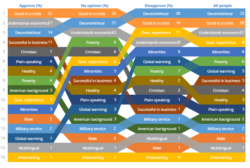Trump Sarah Huckabee To Brooklyn Juice Guy “Put Up Or Shut Up”
Press Release (ePRNews.com) - BROOKLYN, N.Y. - Mar 28, 2017 - Jose Franco, the owner of Stoop Juice in Park Slope Brooklyn reported someone claiming to be Sarah Huckabee called him on his smart phone from a blocked number at 3am. This is the second member Trump’s administration to call him in the last 50 days, President Trump being the first. “Why are you making stuff up about the President when it’s obviously a failed attempt at publicity for your business”, proclaimed Sarah Huckabee. “If President Trump didn’t call me, why are you calling me.” Jose replied. According to Mr. Franco, Ms Huckabee’s phone dropped on the floor for a moment. He overheard Ms. Huckabee talking to herself while recovering the phone repeatedly saying, “Obama wiretapped Trump Towers.” Once back on the phone Jose replied “That’s a lie made up to distract the us!” Upset, Ms Huckabee shouted, ” Since you know it all, why don’t you put up or shut up!” and hung up the phone. Jose took this as a call for help since the White House team is understaffed.
Since our life always expresses the result of our dominant thoughts Jose wrote something for both President Trump and Sarah Huckabee:
The heart of an economic system is its principle of distribution. Real wealth is goods and services; its production takes place in the physical world under natural laws that are everywhere the same. Regardless of an economy’s political structure, production problems must be solved pragmatically through science, engineering, technology, management and the skills of labor. Out of the production process, however, arises wealth or income, and distribution of this wealth or income involves problems of a different order.
There is a political dimension to distribution as well as a physical one; its character is derived from the economy’s principle of distribution. Upon the choice of distributive principle turns, for good or ill, an economy’s ethical, motivational, and even engineering characteristics. In the long run, the distributive principle will control the quality of life obtainable in the society — not only material abundance, or lack of abundance, but also such intangibles as the presence or absence and degree of personal freedom, justice, leisure, autonomy, and social cohesiveness.
Contrary to the popular belief that there are many distributive principles from which economic policy-makers may select, in the absolute sense there are but two. The first alternative is the principle of private property. The second is the principle of need.
Presently, our society in its public philosophy has overwhelmingly preferred the private property principle — that wealth belongs to those who produce it. The reasons are pragmatic. Before an economy can have a distribution problem, there must be a product to be distributed. No other incentive keeps people continually interested in doing those things that encourage production as sought after wealth, or money, that their labor or property has brought into being. The private property rule is embraced by socialist and capitalist all the same. Private property is also the ethical heart of the labor movement, and argues every worker owns his or her own labor power and is thus entitled to receive, as a right, all of the wealth his or her labor produces in the marketplace. The private property principle makes it possible to objectively determine economic value and competitive markets (no isolation or protectionism). Without competitive markets, how can we determine the price of the items we buy and sell? If not, distribution of goods would be settled by brute force or arbitrary opinion.
The second alternative principle of distribution disregards productive input; its solely based on human need. By “need” means the animal side of human beings and their creature-comfort requirements. It’s the mechanism for allocating wealth or income among all people not on the basis of the productive input of those who participate in production, but on the basis of an opinion or appraisal of the “need” of the people, whether or not the they participated in the productive activity, and irrespective of the extent of that participation, if any. All people would have to agree to be selfless in order to focus on the greater good. “To each according to his need” is of necessity a totalitarian principle. Its coercive nature is demonstrated by the fact that wherever it is found in society — family, military and religion— the organization of the distributive group is authoritarian and its members constrained to obey. Resentment arising from petty bickering over “sharing” (i.e., distribution) create friction among members and many exit these groups.
Applied to a national economy, the need principle compels administration by government in order to avoid the resultant social strife. For the need principle, is unworkable so long as individuals remain even slightly selfish. For the exception of a military state, the need principle fuses politics and economics into a large and impersonal political, corporate, or social structure regarded as intractably indivisible and uniform because those who determine economic need are the same public office holders who wield the society’s political power.
Where do we go from here?
Only when the masses mobilize can we bring change to society. Mobilization has to be organized and have defined goals. It’s easy to point out problems, it takes continual work to identify and come up with solutions to these problems. Mobilization’s biggest obstacle is getting people to be in agreement simultaneously of one societal constraint at a time. Ideally, a mobilization plan would address everyone’s own needs. But that would leads to social disorganization, for each decides his own needs disproportionately to what most people want, or to what others decide for themselves. And since such chaos is intolerable to society, our communal disorder reinforces the states totalitarian approach. The need principle also disregards the property rights of current owners and workers. We realize, time spent helping others getting their affairs straightened out take away from time needed to keep our own houses in order. America needs servant leadership based on a philosophy and set of practices that enriches the lives of individuals, builds better organizations and ultimately creates a more just and caring world. Jose ended with, “Hope this helps Ms Huckabee”.
http://patch.com/new-york/new-york-city/did-trump-hack-bk…
Source : Stoop Juice




